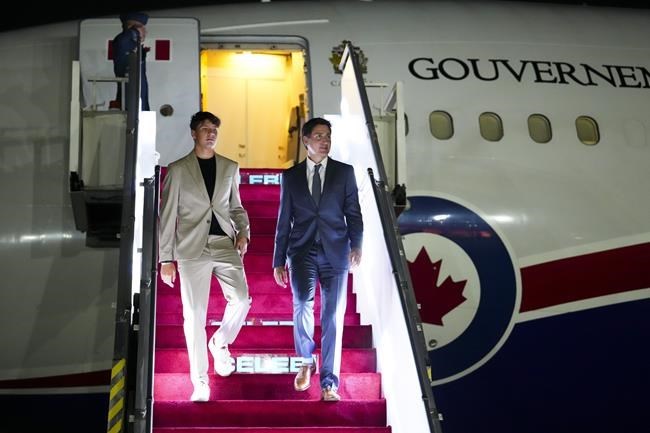NEW DELHI — Foreign interference at home and Russia's invasion in Ukraine are both top-of-mind issues for Prime Minister Justin Trudeau as he heads into the two-day G20 leaders' summit in India this weekend.
Climate change, global food and energy security and gender equality are also high on the agenda, but the Russian invasion could prevent the leaders of the worlds biggest economies from reaching a consensus statement at the meeting's end.
Trudeau has already made known his disappointment that Ukrainian President Volodymyr Zelenskyy was not invited to attend or address the summit, and has promised to keep Ukraine's plight on the agenda.
"We will be speaking up strongly for you," Trudeau told Zelenskyy in a video call the two had Aug. 24.
Zelenskyy did address the G20 summit in Bali last year remotely, but Indian President Narendra Modi is looking to focus more on the global impacts the war is having on supply chains and energy supplies, and avoid the geopolitical tensions as much as possible.
Modi is also seeking to make development needs in the Global South a key part of the talks, and is pushing for the African Union to be admitted as a G20 member.
Trudeau will chat briefly with Modi one-on-one on the margins of the summit Sunday, where he's expected to raise concerns about foreign meddling in Canada's politics. India would not confirm the meeting until after Trudeau landed in New Delhi Friday, and it will only be a 10-minute pull-aside rather than a formal bilateral meeting.
India, now the world's most populous country, is featured prominently in the Indo-Pacific, a region Canada is seeking to expand its trade reach to and reduce the influence of China.
But Canada's national security adviser, Jody Thomas, flagged India last spring as a top source of foreign interference in Canada, particularly around support within Canada's Sikh community for separatist sentiment emanating from the Indian state of Punjab.
Trudeau vowed Friday that he would raise the issue of foreign interference if granted a face-to-face meeting with Modi.
"As always, we will emphasize how important the rule of law is," Trudeau told a news conference in Singapore before departing for New Delhi.
China is not the only country deserving of scrutiny when it comes to foreign interference, said Trudeau, whose Liberal government on Thursday announced a long-awaited public inquiry into alleged Chinese activity in Canada.
"It is incredibly important that we continue to protect Canadians from any and all types of interference," he said.
"One of the things we're focused on in this inquiry is recognizing, yes, China and Russia are responsible for interference, but other countries engage in it as well," adding that the commission "will go where the facts bring them."
While COVID-19 has featured prominently in discussions at the last several G20 meetings, it isn't expected to dominate the talks again in New Delhi. But the Canadian delegation remains plagued by the virus, with four members of the travelling delegation on the Asian trip testing positive.
The officials were forced to remain behind following stops in Indonesia and Singapore. A spokesperson for the prime minister would not provide further comment to respect the privacy of the individuals. Trudeau has tested negative.
The normal result from a G20 summit is a lengthy document, known as a "communique" listing all the areas on which the world's largest economies agree to work co-operatively. But getting to such an agreement is getting harder.
China and Russia, whose leaders are both skipping the summit and sending officials in their place, have already rejected any reference to condemning the invasion in Ukraine.
Whether Canada, the United States, and other G7 allies will agree to a communique without such language isn't clear. British Prime Minister Rishi Sunak has said he intends to push the G20 leaders to take a tougher stance against the invasion.
Indian High Commissioner Sanjay Kumar Verma said Ukraine wasn't invited because Modi wanted to focus on developing countries, which could serve as a solution to globalization concerns.
"We feel that G20 is a platform through which we can try to address problems of developing nations," Verma said to The Canadian Press.
He also noted that the Russian invasion of Ukraine is "just one of them".
"Many times the international narratives are focused on some issue and not on others. There was conflict, civil war in Ethiopia. There is still a civil war going on in Sudan. There are hungers in Congo, Chad, Niger. So there are many such flashpoints in the world," he said.
Trudeau told reporters on Friday that the G20 was never a G7, which is a gathering of like-minded countries that share the same values.
"The G20 was never about sharing values or alignment. It's about a forum, really important forum, largely created ... to come together to talk about how they collectively shape almost the entirety of the global economy," Trudeau said.
This report by The Canadian Press was first published Sept. 8, 2023.
— With files from Dylan Robertson in Ottawa, and The Associated Press.
Mickey Djuric, The Canadian Press



